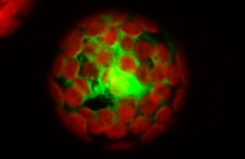News
Cellular trash bins show a surprising activity that controls plant immunity
 Edinburgh, December 2018 - The Spoel Research Group publishes a paper in PLoS Pathogens showing that plant proteasomes, which function to degrade proteins, contain an unexpected activity that is required for appropriate activation of plant immune responses.
Edinburgh, December 2018 - The Spoel Research Group publishes a paper in PLoS Pathogens showing that plant proteasomes, which function to degrade proteins, contain an unexpected activity that is required for appropriate activation of plant immune responses.
Plants are continuously exposed to different disease agents, including bacteria, fungi, oomycetes and chewing or sucking insects. To protect themselves plants have evolved a sophisticated multi-layered immune system that depends on the reprogramming of large gene repertoires to prioritize the expression of immune genes over normal cellular household genes.
Activity of the proteasome, a large proteolytic complex that degrades proteins, is vital to coordinate the expression of immune genes. While it is well understood that proteins marked by a chain of the small polypeptide ubiquitin can be targeted to the proteasome for degradation, it remains unclear how these proteins are processed by proteasomes.
In a publication in PLoS Pathogens the Spoel Research Group identifies the enzyme UPL3 that enabled plant proteasomes themselves to add further ubiquitin chains to cellular proteins destined for degradation. This is thought to be an important activity that increases the affinity of substrates for proteasomes while preventing them from stalling during degradation.
Importantly, it was shown that this activity of UPL3 is indispensable for gene expression reprogramming and establishment of disease resistance. Thus, by enabling proteasomes to add ubiquitin marks to its substrates, UPL3 regulates key aspects of plant immunity that could be further exploited in future crop protection strategies.
Published:
Furniss JJ, Grey H, Wang Z, Nomoto M, Jackson L, Tada Y, Spoel SH (2018) Proteasome-associated HECT-type ubiquitin ligase activity is required for plant immunity. PLoS PATHOG 14: e1007447 (PDF).







